| By David Chace |
| Jul 2, 2014 |
| Ulaanbaatar, Mongolia |
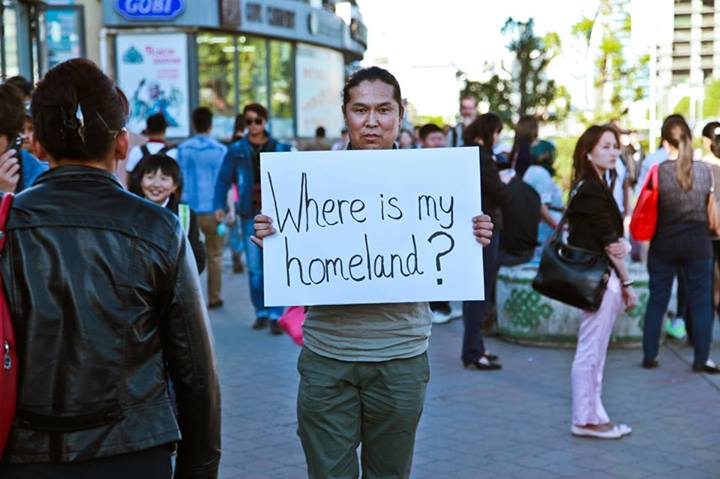 |
|
Last month two Inner Mongolian musicologists, Dalaibaatar and Tulguur were among those to face unlawful arrest prior to being trafficked to China.
The two men, along with several other rights activists, were scheduled to address local media regarding claims that Alhaa was being targeted by Chinese secret police in Mongolia.
One of the men, Tulguur, had received a letter of deportation on May 5th, instructing that he had ten days to leave Mongolia. He claimed that no reason was given. He quickly applied for and received an asylum seeker certificate from the United Nations High Commission on Refugees (UHCR). As a result, Tulguur's deportation had been postponed by the Ministry of Law until June 16th, 2014.
Dalaibaatar had a valid student visa, however both men wanted asylum from China as they considered themselves political exiles and were afraid of schemes by authorities to jail them in China, they said.
Tulguur and Dalaibaatar, along with fellow activists Ganbaatar, Munkhbayar and Sarnai, felt it was important to speak out against the potential extralegal deportation of Alhaa to China, where they feared he would lose his freedom because of his political opinions. Such deportations are forbidden in Mongolia's constitution and numerous international law conventions.
On May 13th, at 11am, more than a month before Tulguur was due to be deported, he and Dalaibaatar were scheduled to speak at TV 8 news station. The two were with Ganbaatar and Sarnai waiting inside as camera crews gathered, where a press conference was set to begin.
Sarnai noticed that some of the organizers, Ch. Munkhbayar and members of the 'Just Citizens Coalition', had not arrived. She called Munkhbayar and he said that some casually dressed men had approached them at the door of the station and asked to speak with them.
A while later, Munkhbayar's secretary called Sarnai, "the other organizers had been arrested," she said. The secretary advised both "Dalaibaatar and Tulguur to leave quietly and avoid being noticed," so they both did so, says Sarnai.
Sarnai explained to the reporters that some of the meeting organizers were being arrested and detained. She commenced the meeting and explained Alhaa's situation on camera.
After the meeting, Sarnai received a call from Tulguur's wife who believed that Tulguur and Dalaibaatar had been arrested.
They raced to find help from local human rights organizations. "The United Nations High Commission on Refugees and National Human Rights Commission agreed to contact police the next morning and investigate," Sarnai later told reporters. "But by the next morning Dalaibaatar and Tulguur were already being moved to the border by police" she said.
Police would not confirm whether any charges had brought against the men. So too were the men denied their right to seek legal advice or contact their families. "We kept calling their phones. The lines were open and their phones were ringing but no one answered. One time Dalaibaatar answered but he only sighed and didn't respond to questions," Sarnai explained.
Sarnai was beside Tulguur's wife, Batzaya, as she spent the entire day trying to connect to them again. "Between 7 and 8 AM, May 14th, Tulguur called us" Sarnai said. "We are on the Chinese side of the boarder," he said. "What should we do? Should we try to escape to Mongolia?" Batzaya didn't know what to say. Tulguur had to hang up. "That was the last she heard of him," said Sarnai.
Journalists from Southern Mongolia Human Rights Information Center report contact with Dalaibaatar at 9 AM on the 14th. "Dalaibaatar confirmed that the two had already crossed the border into China, then an unidentified voice was heard telling him to hang up," the report says.
Tulguur's wife, Batzaya, and Dalaibaatar's girlfriend are both Mongolian citizens. Soon after, they each travelled to Ereen city in Inner Mongolia, hoping to locate their partners. Despite media requests, both women declined to be interviewed. "I am in customs now. At the moment I don’t have any further information about their status and it is inconvenient for me to talk here," Batzaya said.
Since then there has been little contact. "They are being silent in order to not to anger the Chinese police and cause more suffering to Dalaibaatar and Tulguur," Sarnai believes.
Mongolian authorities and law enforcement agencies have yet provide any explanation for the men's deportation.
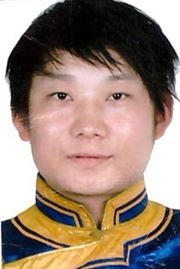 |
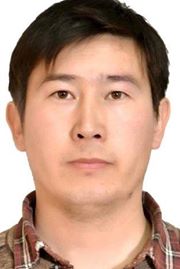 |
||
|
Dalaibaatar |
Tulguur |
Such a story may sound like something from the Great Repression in the 1930's, but for the last year and a half, this has been Norovtserengiin Alhaa's universe.
Alhaa was born to a Mongolian herder family in Shiliin Gol province, Inner Mongolia in 1968. He moved to Mongolia in 1992 as a student at MUIS. There he met a woman named E. Undarmaa. They were legally married in 1994 and they gave birth to their daughter, Nandintsetseg in 1995.
"About 1,000 Inner Mongolians came to the State of Mongolia in the early 90s, but only about 10 have stayed and integrated," explains Nyam Ochir, a scholar who studies Inner Mongolian cases. "Alhaa was one of the first to marry and has been overcoming cultural barriers for over 22 years. He has made friends and lives like a citizen."
"Alhaa's giving nature won my affection," remembers Batmunkh, Alhaa's mother-in-law, "once he gave away his sheepskin coat while he was sick in a hospital. He was shivering when he came out and I yelled at him," she laughed. "My daughter told me that there would be difficulties because of Alhaa's citizenship. I worried about this but I met with some very respected Inner Mongolians in Darkhan who told me that it would be hard, but Mongolia was a democracy with a brighter future and their rights would be respected," she remembers.
Integration was not always easy. Alhaa's daughter Nandintsetseg regularly drew negativity from adults and children at school for the Chinese name marked in her passport. Instead, they sent her to France, where she might attend school - where her mother, Undarmaa, had also planned to study for her doctorate degree.
By 2010, Undarmaa would undergo cancer treatment at a local French hospital. Batmunkh traveled to France but Alhaa, afraid of the Chinese secret police, could not go to Beijing to apply for a travel visa, he said. Undarmaa died soon after, leaving Alhaa to grieve a continent away from his family.
Despite this, Alhaa, Batmunkh and his daughter remained a tight-knit family. "Nandin comes back to Mongolia every year and spends the whole summer with her father and I," Batmunkh states."Alhaa always takes her on special trips to beautiful, historical places. When Nandin was young he taught her to read the Secret History of the Mongols. It's boring for a small child at first so he coaxed her into reading a passage a day. He's clever like that" she said.
"In school they used to teach us that Westerners were imperialists, that the west was trying to destroy us" Alhaa said as he chuckled, "we didn't learn anything about the true history of oppression in Inner Mongolia."
"My grandmother and grandfather were persecuted by the Communists. When I was a newborn infant I was very ill and all the doctors were afraid to help me," Alhaa explained. "Everyone feels tense in inner Mongolia. We aren't allowed to speak openly about what we know is happening there."
"When Mongolians and Chinese fight, Mongolians are jailed and Chinese go free. The government takes Mongolian people's land illegally and there is no recourse for them. There are no human rights in China" Alhaa said.
Some of Alhaa's Inner Mongolian supporters showed pictures that they say are widely spread among Inner Mongolians. The pictures show mutilated horses and slaughtered livestock. They claim these unpunished hate crimes outrage Inner Mongolians.
In 2011 a young herder named Mergen was intentionally killed by a mine's truck driver. This sparked protests in Hoh Hot. The army was brought in to clear the streets and repress university student activities. "They moved the victim's mother off her land, bought her an apartment and gave her a pension. She had to go on TV and express how grateful she was for the compensation, then they looped it over and over on all the channels during the tensions. If she didn't agree to say thanks they would have hurt her other sons," Alhaa claims.
In 1999, Alhaa began joining regular protests in Mongolia after attending a speech by Hada, an Inner Mongolian activist who inspired dissident movements and was later jailed indefinitely.
By 2000, Alhaa had begun assisting refugees in-transit - those fleeing Inner Mongolia for fear of persecution, on their way to states where refugees are protected.
Alhaa says he has felt pressure from Chinese intelligence since the early 90's. "When I travelled home to Inner Mongolia in the summers Chinese police would come to my ger and just stare at me for long whiles" he said.
Alhaa says that Chinese border patrols would harass him whenever he left Mongolia. He and others would turn their passports in on the bus, then as everyone got their back, his would be missing. "What crimes have you committed?," the bus conductors would ask.
Alhaa was imprisoned by border police twice. He experience physical abuse, extortion, and in 1994, missed the passing away of his mother because he was jailed for 18 days.
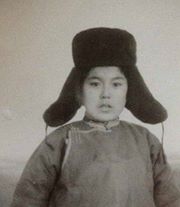 |
|
Alhaa's Childhood Photo |
By the 2000's, word spread that Alhaa became a target since they discovered he had harbored refugees. However much of this was uncertain.
(Names of police officers have been redacted for the safety of Alhaa)
On January 17th 2013, at 5 AM, police arrived to arrest Alhaa. They claimed that he had been implicated in a criminal investigation by a man named, now deceased. No evidence was produced.
As they travelled to the police station, the arresting officer told Alhaa: "we are going to deport you." Alhaa described the first interrogation in a statement to the UN and foreign embassies:
The officer asked me, "Do you live with two other hujaa (racial slur for Chinese)?"
I said "They are Inner Mongolians not Chinese".
Then he threatened me "What is an Inner Mongolian? You all will be killed (I will kill you all). Why do you hate Chinese?"
Alhaa was brought to the police chief's room on the second floor of the police station.
At the station, Alhaa says, the police chief didn't ask very much about the allegations of criminal activity. Instead, he asked: "why do you hate China?", Alhaa explains. "I have no knowledge of these people or what they have done, and I want to speak with a lawyer," Alhaa said. He was not allowed to call a lawyer and no lawyer arrived.
Alhaa further alleges the following: at approximately 9 AM on the day of his arrest, a large man in plainclothes, later identified as another police chief, entered the chief's room and began beating Alhaa. The man punched him with full strength 5 to 6 times, Alhaa recalls. He shouted slurs: "You hybrid bastard of a dog and wolf! Why are you ruining Chinese-Mongolian relations!".
The police chief told Alhaa he would be deported. Alhaa saw the lieutenant contact Zamyn Uud police, asking that they gather information about Alhaa from the Chinese police in Ereen city.
Alhaa was then taken to a prison and put in a cell. "I wasn't allowed to leave or do anything but eat for three days," Alhaa said. "As I was being matriculated, the clerk asked me what had happened to my head. I told that person that I had been beaten, that I didn't feel well and I wanted to see a doctor. The clerk ignored my request," he remembers.
On January 20th, the fourth day of arrest around 2pm, Alhaa was taken back to the police station. "That night I was made to spend the night cuffed to a radiator underneath the police station stairs among the station's rubbish," he said.
"On Jan 21st, 2013, around 1pm, 4 policemen and two witnesses came and searched my house for 3 hours. We went back to the police department, I was charged with "racketeering" and I was released upon 5 million tugriks’ bail."
Later that week, he claims, Chinese police arrested and interrogated his friend in Inner Mongolia. He was told that Chinese police had said that, "unfortunately at this time, we can't find a way to legally extradite Alhaa, but we will get him and when we do we will kill him. If you talk about this, we will kill you too."
***
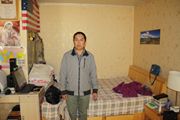 |
| Alhaa and his daughter's home |
"His head was swollen all over," his mother-in-law explains. "I hadn't been able to reach him for days. When I saw him, from a distance he looked fat and pale, then I saw that he'd been beaten" she said. "Now he gets periodic migraines, they are so severe that he cripples over in pain, or passes out," she said.
Police did not file their case against Alhaa to the chief prosecutor for 11 months. During that time, police harassment continued. Every day of the week be called to report to the police station and made to sit in the corridor from 8am to 6pm. Despite never being questioned during these periods, police regularly told him he would be deported.
Alhaa found a lawyer, but she could not get the police chief to speak with her. "He kept putting her off and telling her he was busy for three months until we gave up," Alhaa said. The calls to the station happened every week day for 4 months, then periodically for the next 4 months.
Upon reviewing the case, the chief prosecutor cleared Alhaa of all charges. However, Alhaa claims that the 5 million tugrik bail was never returned. "I call periodically but the bailer always has an excuse," he said.
"They made me jobless in order to justify revoking my green card and making me too poor to leave the country," Alhaa believes.
"These kinds of techniques are very common if there is collusion with the Chinese government," a source explained, who asked not to be named for fear of reprisal. "It's very common (for authorities) to try to find reasons that often don't make much sense to imprison people or to keep them coming back to police stations over and over. The Chinese government has a particular focus on shutting down middle men in refugee networks like Alhaa," they said.
In January 2014, Alhaa returned home from a meeting on human rights issues in China, Alhaa said. There he would find a policemen that he recognized from the station waiting outside. "Why are you organizing protests? Why are you trying to unite Inner Mongolia and Mongolia?" he asked. "I just went to a meeting," he said and went inside.
In 2012, two years following the death of his wife, Alhaa had applied for a family visa. He submitted his wife's death certificate, his daughter's birth certificate and his residential registration. It was accepted.
Alhaa knew that his Mongolian visa was due to expire in March 2014. In February, over a year after the arrest, Alhaa applied for a extension. "The immigration office put my application on hold while it was 'under investigation'," says Alhaa.
On May 5th, almost four months after the application was received, Alhaa received a letter stating that his family status visa had been revoked. "They said it was because my wife was deceased and I had not seen my daughter in fourteen years," he said.
Alhaa and his mother-in-law went to the Immigration Center. They were told, "that he should apologize for misleading visa officers and leave the country, where he can apply for a different type of visa. The officials tore up his green card, gave him a black stamp fined him and told him he had to leave the country in 10 days. They wouldn't tell us anything else," his mother in law explained. "I thought I had a few days before a Chinese gulag," Alhaa explained.
***
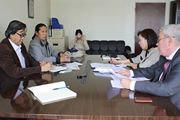 |
| Meeting at Mongolia's National Commission of Human Rights |
"First Tulguur was not going to be deported then he was deported together with Dalaiabaatar. According to Mongolia's constitution and many international agreements a person should not be forcefully deported to a country where their life is in danger," said a representative of Amnesty International Mongolia.
The secret deportation of Tulguur and Dalaibaatar, and the arrest and expatriation of a third Inner Mongolian activist named Tuvshinzaya to the Czech Republic, prompted allegations of corruption and human rights abuse by activists and journalists.
"Mongolia, the independent country of Mongolia, has already become one of the very few countries where the human rights of Southern Mongolians are violated the most," said Munkhbayar Chuluundorj to a press conference.
"It's human trafficking," said Nyam-Ochir, a cultural studies professor who advocates for Inner Mongolians claiming rights abuse in Mongolia.
Alhaa drafted an open letter to Mongolian President Tsakhia Elbedorj, requesting that he be allowed to extend his familiar visa in order to prevent arbitrary deportation. The letter included a signed statement from Alhaa's daughter, providing copies of her passport documenting that she has returned to Mongolia every summer since leaving for school.
Shortly after the letter was published, Alhaa's mother went to the Department of Immigration to explain her son's family situation. She claims an official told her, "You had many ways to solve this problem but you went straight to the media and gave society the wrong idea about us. Now we won't give you any special help. Alhaa will have to leave the country and apply."
On May 21st, Ministry of Immigration representatives were interviewed by Mongol TV's nightly news. In response to questions, an immigration ministry spokesmen stated that, "Alhaa was dishonest," but refused to elaborate further.
"When asked about the danger of Alhaa going to China, one spokesperson was completely shocked that Alhaa did not know he could go to another country besides China to reapply," said journalists .
Alhaa has sought support from numerous embassies based in Ulaanbaatar and has since reapplied for UN asylum. "We need to make sure Alhaa is safe from the threat of deportation to China," said Enebish, Alhaa's lawyer. "Because Alhaa is an only parent and his daughter is a citizen of Mongolia, we need to make sure that their right to have a family is also protected."
News of Alhaa's situation grew.
On May 23rd, the director of Mongolia's Department of Immigration, Purevdorj, contacted the National Human Rights Commission. In a reported conversation, he claimed that Alhaa would not be deported back to China.
The following Tuesday Director Purevdorj contacted both Alhaa and his lawyer, offering assistance.
On Thursday, June 5th, 2014, "the director met me and gave me a one-year resident's card personally" Alhaa said. "Its very unfortunate about Tulguur and Dalaibaatar. You can become a citizen of Mongolia, let's be open" he told Alhaa.
Before giving Alhaa the residency card, Purevdorj made a public statement to cameras:
"Alhaa has been living in Mongolia for over 22 years. During these 22 years, Alhaa has never applied to become a citizen, he has never applied for asylum and he hasn't paid his taxes. It is for these reasons that we denied Alhaa's application. We are giving Alhaa a residency card now not because we trust Alhaa, but because his beautiful father and mother wanted him to have one.
We hope that Alhaa will pay his taxes and work for the future of Mongolia and that next year it will be easier for Alhaa to apply."
"Most Mongolians aren't like this. Most Mongolians are very good and supportive of one another," said Alhaa. Over a thousand people have signed a petition which speaks to his family status and good character. In May, others launched a Facebook group called "Free Tulguur and Dalaibaatar" to offer further support.
News of Alhaa's residence permit prompted 84 likes and 127 comments on the 5 main online news sites. Commenters called Alhaa a fellow Mongolian and encouraged him to become a citizen.
There is only one Inner Mongolian that we know of who has become a Mongolian national citizen to date" said Nyam Ochir. Nyam Ochir and others are establishing an NGO that help Inner Mongolians integrate and protect their human rights.
Meanwhile the search for Tulguur and Dalaibaatar continues.
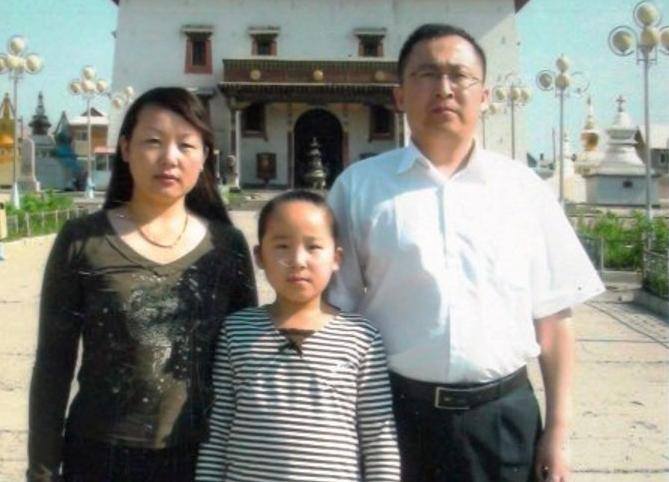 |
| Batzangaa and his family were secretly deported to China in 2009 while seeking asylum from the UN in Ulaanbaatar. Batzangaa, who founded the Tibetan-Mongolian School of Traditional Medicine, is now in jail for 'economic crimes'. His wife and daughter have reportedly been psychologically tortured by Chinese authorities while under house arrest. |





 Beyond
Great Walls: Environment, Identity, and Development on the Chinese
Grasslands of Inner Mongolia
Beyond
Great Walls: Environment, Identity, and Development on the Chinese
Grasslands of Inner Mongolia China's
Pastoral Region: Sheep and Wool, Minority Nationalities, Rangeland
Degradation and Sustainable Development
China's
Pastoral Region: Sheep and Wool, Minority Nationalities, Rangeland
Degradation and Sustainable Development The
Ordos Plateau of China: An Endangered Environment (Unu Studies on
Critical Environmental Regions)
The
Ordos Plateau of China: An Endangered Environment (Unu Studies on
Critical Environmental Regions)